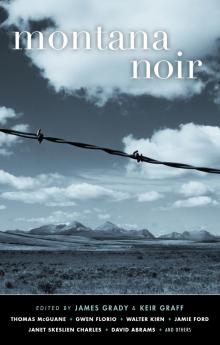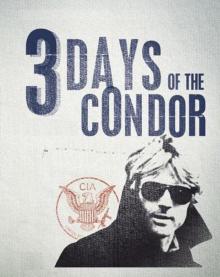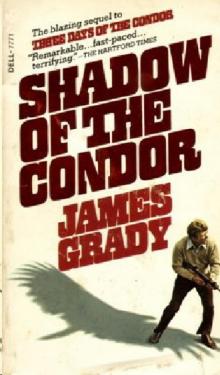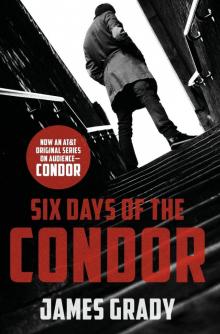- Home
- James Grady
This Given Sky Page 2
This Given Sky Read online
Page 2
Steve rented an apartment in a former motel. Bartended three nights a week at the Tap Room, the bar owned by the best friend of the boxer/pilot. A lot of those nights, Thel’d get a call from Steve at the bar, asking her to pick up dinner he’d ordered from some café. Most of those meals he’d insist on sharing while she sat at the bar nursing a Diet Coke because: “If I start drinking, I’ll like it too much.” Each month, they made a ritual of mailing checks for their student loans. Thel’s check was often light, and more than once, Steve slipped dollars from the tip jar into her jacket “cause you practically work here.” She always tried to say no, always needed the cash, knew the Tap Room customers hadn’t been that generous, never embarrassed Steve by calling him on his lie.
Grady
We all need the space to be who we pretend we are.
They never talked about it, but Thel knew women who’d followed Steve home from the Tap Room. One banker’s wife fucked him for two months to get back at her husband. For a while, Thel’d spot Steve’s battered Chevy parked up on Knob Hill outside a trailer of a wild-haired woman nearly twice their age who looked like an Italian movie star and had rolled into town, a job at the library, and a reputation for turning down married big shots from Main Street. One Thursday morning, she squirted charcoal lighter fluid all through the trailer, lit a match and drove away from the blaze of where she’d been. Call it arson or call it art, the sheriff never hunted her and she stayed gone. Steve said nothing about her and Thel never asked, just like he never asked about the men—many married—who came sniffing around her. She told them all no long after the tech guy from Havre got tired of the three-hour round trip drive and she got tired of seeing him arrive.
Steve and Thel told each other about phone calls or postcards they got from Jake at various Air Force bases. Thel thought only she kept track of who Jake reached out to the most.
Until one night as they dipped his French fries into ketchup at the bar, Steve told her: “Feels like he’s trying to keep it even.”
“Uh . . . yeah.” She waved a French fry like it was nothing. “That’s like him. Hell, that’s us, right? Who we are. All . . . even.”
“Damn!” said Steve. “All this time I thought we were all odd.”
They laughed and dropped all talk about the score.
Her father died two days before her twenty-sixth birthday, October, 1990. The newspapers reported stories about the end of the Cold War.
Steve stood beside her as they lowered the cheapest coffin she could buy into the frozen ground of the cemetery.
The co-op gave her three days off and because Melinda Jacobson was retiring, Thel knew that, along with debts and the lease on her father’s house, she was inheriting Melinda’s assistant manager job.
“Heck,” said their kindly boss, “as sharp as Thel is, she’ll be running the place before she’s forty.”
November, 1990. The first Texan named Bush was President. Five weeks after the earth swallowed Thel’s fate of being a daughter.
Thel’d worked late the night before, something not often done in her Montana town that respected the clock. She needed to give her staff face-saving time to catch up to what she’d done while they were home with their families, so decided to come in after lunch instead of at nine A.M.
The habit of medicating a coughing man woke her before dawn. She lay there listening to silent darkness. Slowed her breathing. Couldn’t make it stop. Get up or you’ll stay under the covers forever! She pressed her bare feet on the thin-carpeted floor. Made coffee. Showered, brushed her teeth with mint toothpaste, made her bed, laid out the bra and panties, the blouse, sweater, and slacks she’d wear, wondered what the boss would say when she told him she was through with pantyhose. She was naked. Staring at her work clothes laid out like a corpse on her childhood bed.
Get out of here! She threw on a blue terrycloth robe, jammed her feet into tattered moccasins, ran outside. The screen door banged behind her. Thel stumbled around to the alley. Ended up standing by the ash tree and the garbage cans, the west wind whipping her shoulder-length hair. One hand combed the brown strands off her empty eyes and the other held the robe closed. Inside her skull echoed what the hell, what the hell.
Folks the mayor wouldn’t name had complained about the garbage collectors doing a bad job. The mayor called the city crew’s boss, who bucked it down to street foreman Steve, who wouldn’t chew out the garbage men until after he’d checked out what was what. After lining out work for his guys at the eight A.M. shape-up, he climbed into a white city pickup and, as he often did when inspecting his town, checked out Thel’s block.
The white pickup crawled down the alley past Thel’s house where everything looked normal. Steve dropped his gaze to the side mirror.
Saw Thel’s blue-robed figure.
Saw her reflection shrink in his mirrors.
Steve hit the brakes. Slapped the gearshift into reverse, whined backwards down the alley, bailed out and marched to where she stood brushing her brown hair off her face and holding her blue robe closed. He felt like he’d stepped off the edge of the world. Saw her eyes fill with him and she said nothing—nothing—as he cupped her face in his rough hands and kissed her, his heart thundering and oh yes it was that kiss in the sun and the wind and the cold November morning.
He pulled back. Held her face.
Said: “I guess I’ve been wanting to do that for forever.”
“I guess now’s the time,” she whispered.
Leaned in to their next kiss.
Steve wanted to tell Jake. Hell, Steve wanted to tell the world.
Thel said it was too soon after the funeral to be official. Too important to just blurt out on Main Street.
“But why not Jake?” said Steve.
“Let’s wait until we make it solid before we tell him.”
“I love you,” said Steve. “Doesn’t get more solid.”
“I know,” said Thel. “But trust me on this.”
“Trust you on everything,” said Steve.
Two weeks later, Steve’s apartment building caught fire. Except for smelling like smoke, his possessions were fine, but he needed a new home. Thel had to admit that her moving out of the rented place she’d always called home and them moving in together, living together, made all kinds of sense. But she stalled, told Steve she dreaded offending her Very Churchy boss even though yes, he couldn’t and wouldn’t fire her for living in sin.
But she came to the Tap Room nine nights later while Steve still “officially” lived on the couch of Len, a Vietnam vet with a 100 percent mental disability pension who’d known Steve’s KIA’d biological father before they both became ghosts of that jungle war. Thel claimed a barstool under a pine wreath Christmas decoration. Steve poured her Diet Coke, but Thel asked for a beer instead that he brought her with a puzzled smile.
“I told him,” said Thel. “My boss. Didn’t mean to, I just . . . said it.”
“What did he say? asked Steve.
“God moves in mysterious ways. Then he smiled. Went back to work.” Thel shook her head. “God moves in mysterious ways.”
“Your moves are mysterious enough.”
She had to smile.
Steve said: “So now I can tell Jake.”
“No!” said Thel: “I should be the one to tell him. Better that way.”
“Mysterious ways.” Steve grinned as he walked down to a customer signaling for a refill at the other end of the bar.
Thel swallowed cold beer.
She spent three days not writing a letter to Jake at his air base in Saudi Arabia where thousands of Americans were staging to rescue Iraq-invaded Kuwait. In that time, Steve cut a lease-to-buy deal for them for a three-bedroom home on Knob Hill.
It’s just a lease, thought Thel as she signed the papers.
That night she lay beside a sleeping Steve in the house where she’d grown up. Felt a cosmic pull from the ink drying on her new lease signature as surely as she felt the drying of the sticky damp between her th
ighs. She slid from the bed, wrapped her nakedness in that old blue robe, bare-footed away from her sleeping lover to sit at the kitchen table where she’d had her meals for most of her life. She settled in the silent pale cone falling from the overhead light. In front of her waited a stack of office supply paper.
She clicked a gas station logo giveaway pen from her purse.
Not good enough.
Like a shadow she glided to the dark living room with its stacks of packed boxes, slid open the middle drawer of the desk she and her father used for store work, the desk where she’d done homework. Junior year, she’d written a poem about a stone tossed into a pond making ripples to shape unseen shores. Won third place in a state high school literary contest. Her father had been so proud he bought her a fountain pen “for all the rest of your poems.” That black-with-gold-trim pen lay never used in its box with ink cartridges in that desk drawer, but her hand reaching through the darkness found it straightaway, carried it back to the kitchen.
She screwed a dark tube cartridge into the poetry pen.
Maybe the ink has all dried up.
Scratching the pen’s gold tip on a sheet of paper ripped the silence.
Black lines scarred the white paper.
Now I gotta do it.
Thel lost count of the inked sheets of paper she crumpled and tossed into the trash she’d take out the next morning without Steve noticing. Her heart beat harder with every sweep of the black hand on the kitchen clock.
Can’t do it this way.
That epiphany bought her time. Sure it did. So she wrote:
Jake,
Please be safe and OK.
Everyone worries for you. I worry for you, want you home . It’s so empty here. Your folks and us are OK, but I need you to call me—JUST ME—as soon as you can—daytime in Montana, at my work like you did that one time. Don’t worry, but call, please call.
Then she wrote: Thel
Hid the letter in her purse.
Snuck back into winter’s bed and lay there in warm wool darkness. Listened to Steve sleep. Listened to him dream.
In the morning light, Thel kissed Steve good-bye, took the letter to the post office and mailed it to Jake the fastest way the Air Force had created, then drove to the co-op where her promotion meant she had an office with a glass front and door she could close, so no matter what the women sitting at desks “on the floor” thought they saw, no way could they hear her speak.
If any of them wondered why she now started working with that door closed, they chose not to ask. You cut people slack because if you don’t, you’re tied tight to their troubles.
One day. Two days. Three.
Snow fell and drifted away.
Four days. Five.
Wednesday, January 16, 1991.
Even though the clock on the office wall said it was quitting time, Thel sat at her desk behind the closed door, staring past columns typed on a piece of paper about rates vs. usage linked to service costs, trying to imagine how to structure the report’s next draft to make more sense, to . . .
BAM-BAM vibrated her glass door. Her boss wore his usual Wednesday yellow shirt and tan blazer, but she’d never seen that look on his face as he said: “Did you hear we’re finally at war?”
Thel’s heart bombarded her chest.
“Bombing and shelling,” he said. “It’s all on TV.”
She heard herself say Oh.
“I thought you should know—Steve, too. We got Jake over there.”
“Yes.”
“Gordon Proudfoot’s youngest is there with the Corps,” said her boss, who’d come of age after Vietnam and served with the Marines because that was the right thing to do. “I don’t know about the Curtis boy, he’s Army.”
He shook his head. “Right by the Holy Lands.”
“Not about that,” whispered Thel.
“It’s always about that,” said her boss. “Even if it’s about oil.”
He nodded at the world outside her office. “Martha’s got the TV on in the conference room.”
“I don’t want to watch.”
“I know what you mean.” He cleared his throat. “I know you’re not . . . but in about five minutes we’re going to join in prayer.”
Thel whispered: “I’ll do that in here.”
He nodded, left her alone behind glass.
Screaming silence filled her car when she left work and drove home where, through the windshield, she saw Steve standing at the curb, waiting for her. They took her car, drove through their dinner-hour hometown. Thel saw windows flickering with TV colors, knew what everyone was watching. They parked in front of Jake’s parents’ house, went in to be with the suddenly old couple, where they all talked about how Jake was going to come home safe and sound.
Grew up around them, but I don’t know his parents, thought Thel as they all sat in the living room colored by the TV’s flowing terror. Jake’s dad worked an office job for a trucking company and his mom had some job up at the county courthouse: identity by paycheck, by offspring, by luck. Would it have helped if I knew who you people really are? she thought as they all smiled and nodded their heads to hammer together a certainty where everything would be just fine.
War and TV merged over the next six days. Flickers haunted her office’s glass wall. War TV played in the Tap Room where Steve worked, and whether she was home alone or with him as they packed their lives for the big move, the TV demanded to be turned on.
Tuesday morning—9:17—her office phone rang.
“Hello?” she said. Like the word meant nothing.
“It’s Jake! Jesus, Thel, are you OK?” She heard jets roar in the background of Jake’s voice. “Steve, is he hurt? Your letter scared . . . .”
“We’re fine,” she said. “I’m fine.”
“Good, because I’m who’s supposed to be in danger, not you.”
“Is that who you are?”
Jake said: “What’s wrong? What’s going on?”
“I . . . I moved in with Steve. Together. We’re together now.”
Why couldn’t it be silent on his end of the phone? she thought. Why couldn’t I hear him breathe instead of background roar of planes?
“Like a woman,” Jake finally said. “A . . . a man and a woman.”
“Like that.”
The noise of war came through her phone live, not TV.
Until he said: “You’re the luckiest people in the world.”
She closed her eyes.
“Makes sense,” she heard Jake say. “Seems so right and . . . logical.”
“Logical.” Call it a laugh, then she said: “I guess so.”
“What I mean is . . . congratulations.”
Her eyes opened. Saw nothing. “Thanks.”
“Look, tell my folks not to worry. Tell Steve . . . tell him great.”
“We love you,” said Thel.
“Gotta go.”
Her connection went dead.
She listened to the buzz. Hung up the phone.
TV colors shimmered in her glass wall.
Thel grabbed her coat, stalked out of the building, got in her car and roared north on the interstate. Found herself exiting to Shelby International Airport with its aluminum hangars, green blockhouse, a lone blacktop runway vacant beneath empty sky. Thel stopped the car on the airport’s gravel road. Stared at where she’d once ridden with Jake.
And left him.
Winter wind rocked her old car under a gray steel sky. Patches of snow dotted the prairie. Miles off to her left, she saw houses dotting the west side of Shelby, houses on Knob Hill but not the one she’d signed her name to lease. The heater scent faded from the car, let her smell frozen dust, the cold plastic of her steering wheel. She stared at the lonely plateau airport, watched the windsock flapping like some lunatic finger.
Driving back took a fifteen-minute forever, past the street leading to the giant pink high school built two years before JFK was assassinated when the town wise men absolutely knew that Shel
by was destined to become a major city. She took the long route through town, crossed over the bumpy railroad tracks, drove down Main Street like she had with Steve and Jake before there’d been now-gone stores and whitewashed windows, then she was on the sunset side of town, parking outside the co-op, walking inside, hanging up her coat, sitting behind her desk.
Her boss knocked on her door, came in: “Hi, where you been?”
“Getting here,” said Thel.
As he walked out, she said: “Would you leave my door open?”
Went back to work.
Gave it the smile she had.
Jake hung up the phone at the Saudi Arabian airfield America and its allies had taken over after Iraq invaded neighboring oil-rich Kuwait and upset the way the world worked. Roaring jets vibrated the walls of the air-conditioned call center. The Air Police sergeant in charge saw some kind of smile on the young pilot’s formerly anxious face, figured he’d been right to violate SOP, let the guy make a call before a mission.
“Was the communications test successful, sir?” asked the sergeant.
“Outstanding. Thanks.”
They exchanged salutes and not one wink.
Great, Jake told himself as he rode through the night heat on the shuttle bus to the runway where his A-10 Warthog fighter plane waited beside his mission commander’s matching machine. Great news.
U.S. Air Force
The Warthog is an ugly warbird good for nothing but raining missiles, bombs, and bullets down on enemy tanks or armored personnel carriers (APCs). As Jake walked from the bus to his bird, he realized that with its gray tube body and two rear engines that resembled giant aluminum cans, the Warthog looked like another science project he and Steve had helped Thel with sophomore—no—junior year. He couldn’t remember what they were supposed to be building by gluing two hollow cans to a broomstick.
His crew chief eased him into the Warthog’s titanium bathtub cockpit. Jake scanned dials and gauges, weapons and radar screens, the joystick he’d steer with and its pickle button that he’d thumb to loose death and destruction.

 The Short Takes
The Short Takes Montana Noir
Montana Noir Nature of the Game
Nature of the Game Condor in the Stacks
Condor in the Stacks This Given Sky
This Given Sky Three Days of the Condor
Three Days of the Condor Shadow of the Condor
Shadow of the Condor Mad Dogs
Mad Dogs Six Days of the Condor
Six Days of the Condor Next Day of the Condor
Next Day of the Condor